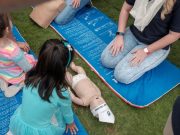Tag: CPR
Time-Dependent Probabilities of Favorable Outcomes Examined After CPR
For patients with in-hospital cardiac arrest, probabilities of favorable outcomes decrease with duration of CPR
AHA: Lung Inflation Occurs Infrequently With Ventilation During 30:2 CPR
Better outcomes seen for patients with ventilation waveforms in ≥50 percent of pauses in CPR
Memories Reported by Some Patients Undergoing CPR for Cardiac Arrest
Normal EEG activity consistent with consciousness emerged as long as 35 to 60 minutes into CPR despite marked cerebral ischemia
ESC: Bystander Defibrillation Improves Out-of-Hospital Cardiac Arrest Survival
Effect was significant even for EMS response times as short as two to four minutes
Survival Lower for Asian Versus White Individuals With OHCA
Despite similar rates of bystander CPR, survival to discharge and favorable neurological survival are lower for Asians
Activation of Volunteer Response System Beneficial for OHCA
Chance of bystander CPR, bystander defibrillation, 30-day survival higher with activation of volunteer response system
Frailty Tied to Worse Outcomes After Perioperative Cardiac Arrest
Findings show higher risk of mortality and nonhome discharge with increasing frailty
Athlete Awareness of Sudden Cardiac Arrest Low
Furthermore, only half of athletes report receiving cardiopulmonary resuscitation training
Schoolchildren Should Learn Basic Life Support
First links in chain of survival can be assessed by children from age 4; regular training in basic life support consolidates long-term skills
Extracorporeal CPR Does Not Offer More Favorable Neurologic Outcome
No benefit seen versus conventional CPR for patients with out-of-hospital cardiac arrest who received bystander CPR














